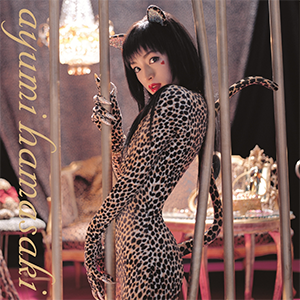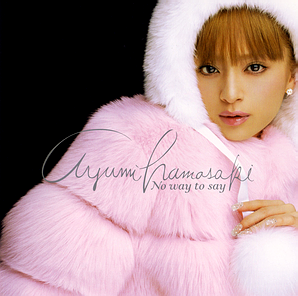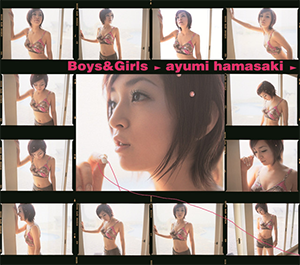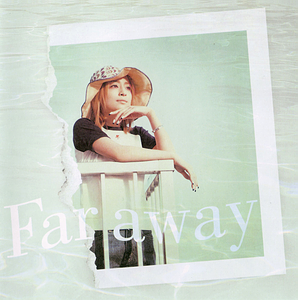
Ayumi Hamasaki is a Japanese singer-songwriter and producer. Nicknamed the "Empress of Pop" on account of her influence throughout Asia, she is widely recognized for her versatile music production, songwriting, and live performances. Hamasaki is the best-selling solo artist in Japan, and a cultural icon of the Heisei era.

A Song for ×× is the debut studio album by Japanese singer Ayumi Hamasaki, released on New Year's Day 1999 by Avex Trax. It was entirely written by Hamasaki herself, while the production was handled by Japanese musician Max Matsuura. Primarily a pop rock album, it features musical composition and arrangements by Yasuhiko Hoshino, Mitsuru Igarashi of Every Little Thing fame, and others. In this album, Hamasaki wrote about her confusion and uncertainty about life, expressed her expectations and hopes for the future, and expressed her gratitude to the fans who love her.

Loveppears is the second studio album by Japanese singer Ayumi Hamasaki. It was released on November 10, 1999 by Avex Trax, ten months after her debut album, A Song for xx (1999). It was additionally distributed in a variety of formats and on different dates throughout Asia. Loveppears was written entirely by Hamasaki, produced by Max Matsuura, and includes collaborations with composers such as Hal, Dai Nagao, D.A.I, Yasuhiko Hoshino, and Kazuhito Kikuchi, among others. Musically, it is a departure from her previous record and incorporates more electronic and dance sounds with elements of trance, house, J-pop, and rock. Lyrically, it explores themes of love, frustration with life, loneliness, and individualism.

Duty is the third studio album by Japanese recording artist Ayumi Hamasaki. It was released on September 27, 2000, by Avex Trax. Duty is Hamasaki's first studio album inside the 2000s decade, and her third consecutive studio album to be fully produced by Japanese musician and businessman Max Matsuura. The album's composing and arrangement was handled by several music collaborators, such as Ken Harada, Kazuhito Kikuchi, Dai Nagao, HΛL, among many others. Hamasaki contributed to the album as the primary and background vocalist, and songwriter to every song. Three different formats were released to promote the album: a standalone CD, a limited edition Playbutton, and a digital download. The cover art portray Hamasaki wearing a leopard-print catsuit.

"No Way to Say" is the thirty-first single released by Ayumi Hamasaki and her eighteenth number-one single. It came out November 6, 2003. The video won the award for "Best Pop Video" at the 2004 MTV Video Music Awards Japan, and the single won the Japan Record Award at the 2003 Japan Record Awards. The song is featured on the mini-album Memorial Address.

"Surreal" is a song by Japanese recording artist Ayumi Hamasaki, taken from her third studio album Duty (2000). It was written by Hamasaki and produced by Max Matsuura. The song is a rock with elements of alternative rock. "Surreal" describes Hamasaki's madness and sense of confusion, while the themes of "Surreal" are based on Hamasaki's concept of loneliness, chaos, confusion, and the burden of her responsibilities, aimed mostly toward her public image as a recording artist. It was released as the fourth single from the album on 27 September 2000 by Avex Trax and Avex Taiwan.

"Whatever" is a song by Japanese singer Ayumi Hamasaki. It was released by Avex Trax on February 10, 1999, and later distributed in a variety of formats throughout Asia. It also serves as the lead single for Hamasaki's second studio album, Loveppears (1999). It was written by Hamasaki, composed by Kazuhito Kikuchi, and produced by Max Matsuura, who also produced the parent album. It was re-released twice, once in 2001 with additional content on a CD single format and again as a double A-side vinyl with her single "Appears".

"To Be" is a song by Japanese recording artist Ayumi Hamasaki. It served as the third single from Hamasaki's second studio album Loveppears (1999). The track was released by Avex Trax in Japan and Taiwan on May 12, 1999, and through Avex Entertainment Inc. worldwide in September 2008. It was Hamasaki's final single to be distributed as a Mini-CD, a format that debuted at the start of her career in April 1998. "To Be" was written by Hamasaki herself, while production was handled by long-time collaborator Max Matsuura. Musically, it is a J-Pop that was written in third person perspective, much like the content from the parent album.

"Boys & Girls" is a song recorded by Japanese recording artist Ayumi Hamasaki, serving as the fourth single for her second studio album, Loveppears (1999). It was released by Avex Trax in Japan and Hong Kong on July 14, 1999, and through Avex USA in North America in early 2001, while being re-distributed in 2003. "Boys & Girls" marks Hamasaki's first single to be made available for purchase as a maxi single with additional remixes. The track was written by the singer herself, while production was handled by long-time collaborator Max Matsuura. Musically, the song is a dance recording, a genre that heavily influences Loveppears. The single's lyrical content is written in third-person perspective.

"Appears" is a song recorded by Japanese recording artist Ayumi Hamasaki. It was released by Avex Trax on November 10, 1999 as the sixth single from her second studio album Loveppears (1999), which was released on the same day. Alongside this, it has been released in several other territories with different release dates under her Western alias Ayu. It also served as Hamasaki's first limited edition single, limiting physical sales to 300,000 copies. The track was written by Hamasaki herself, while production was handled by long-time collaborator Max Matsuura. Musically, "Appears" is a dance song written in third person perspective, and is about the third person watching what appears to be a happy and loving relationship. Upon its release, "Appears" received positive reviews from music critics. Alexey Eremenko, writing for AllMusic, selected the track as the best song from the album and her career. However, an editor from CD Journal criticized the amount of remixes on the CD single.

"Kanariya" is a song recorded by Japanese recording artist Ayumi Hamasaki for her second studio album, Loveppears (1999). It was released by Avex Trax in Japan and Hong Kong on December 8, 1999, and through Avex USA in North America in early 2000. The recording also served as Hamasaki's second limited edition single, with limited physical units of 300,000 copies. The track was written by Hamasaki herself, while production was handled by long-time collaborator Max Matsuura. Two versions of "Kanariya" were made available for consumption—a radio edit produced by American disc jockey Jonathan Peters, and the album version composed by Yasuhiko Hoshino. Lyrically, the song was written in third person perspective.

"Fly High" is a song recorded by Japanese recording artist Ayumi Hamasaki. It was released by Avex Trax in Japan on February 9, 2000, and through Avex Entertainment Inc. worldwide in September 2008. The recording served as Hamasaki's third and final limited edition single from her second studio album, Loveppears (1999), limiting physical units to 300,000 copies. The track was written by the singer herself, while production was handled by long-time collaborator Max Matsuura. Two versions of "Fly High" were made available for consumption—a radio edit composed by HΛL, and the album version produced by Dai Nagao. Lyrically, the song was written in third person perspective.

"Vogue" is a song recorded by Japanese recording artist Ayumi Hamasaki for her third studio album, Duty (2000). It was written by Hamasaki, while production was handled by Max Matsuura. It premiered on April 26, 2000 as the lead single from the album. Her third consecutive lead single to be produced by Matsuura, the song is part of a trilogy from Duty; the other two singles being "Far Away" and "Seasons".

"Far Away" is a song recorded by Japanese recording artist Ayumi Hamasaki for her third studio album, Duty (2000). It was written by Hamasaki, while production was handled by Max Matsuura. It premiered on May 17, 2000, as the second single from the album. The song is part of a trilogy from Duty; the other two singles being "Vogue" and "Seasons".

"Seasons" is a song by Japanese recording artist Ayumi Hamasaki for her third studio album, Duty (2000). It was written by Hamasaki, while production was handled by Avex Trax chairman Max Matsuura. It premiered on June 7, 2000, as the third single from the album. The song is the final part of a trilogy from Duty; the other two singles from the trilogy being "Vogue" and "Far Away".

Ayu-mi-x is the first remix album by Japanese musician Ayumi Hamasaki. It was released on March 17, 1999, to promote A Song for ××. Ayu-mi-x remix album contains 2 discs. Disc 1 is the Remix Club Side which contains dance remixes. Disc 2 is the Acoustic Orchestra Side which contains orchestral remixes and 3 dub mixes.

Guilty is the ninth studio album by Japanese recording artist Ayumi Hamasaki. It was released on New Year's Day 2008 by Avex Trax. Guilty marks Hamasaki's ninth consecutive album to be fully produced by Japanese producer and manager Max Matsuura, while she contributes to the album as the lead vocalist, background vocalist, and songwriter to all songs. Recorded in Japanese with minor phrases in English, Guilty is a rock album with numerous musical elements such as pop rock, heavy metal, synthrock, and power ballad melodies.

"Rule"/"Sparkle" is a double A-side single by Japanese recording artist Ayumi Hamasaki from her tenth studio album, Next Level (2009). The song was released on a CD and DVD format on February 25, 2009 as the second single from the album. With "Rule" composed by Miki Wantanabe and "Sparkle" composed by Kazuhiro Hara, both songs were written by Hamasaki and produced by long-time collaborator Max Matsuura. "Rule" was used as the international theme song for the 2009 film Dragonball Evolution.

Rock 'n' Roll Circus is the eleventh studio album by Japanese recording artist Ayumi Hamasaki. It was released on April 14, 2010, by Avex Trax. It was also released just a little over a year after her 2009 album, Next Level. Rock 'n' Roll Circus marks Hamasaki's eleventh consecutive album to be fully produced by Japanese producer and manager Max Matsuura, while she contributes to the album as the lead vocalist, background vocalist, and songwriter to all songs. Recorded in Japanese with minor phrases in English, Rock 'n' Roll Circus is a rock album with numerous musical elements such as electropop, J-pop, rock, pop ballad, and dance music.
Ayu-mi-x 6: Gold and Ayu-mi-x 6: Silver are two remix albums released by Japanese pop singer Ayumi Hamasaki on March 26, 2008. They are the sixth and seventh entries in Hamasaki's Ayu-mi-x remix album series, and the first Ayu-mi-x albums since 2003's Ayu-mi-x V. Following 2005's My Story Classical, they are the first remix albums in roughly four years.













